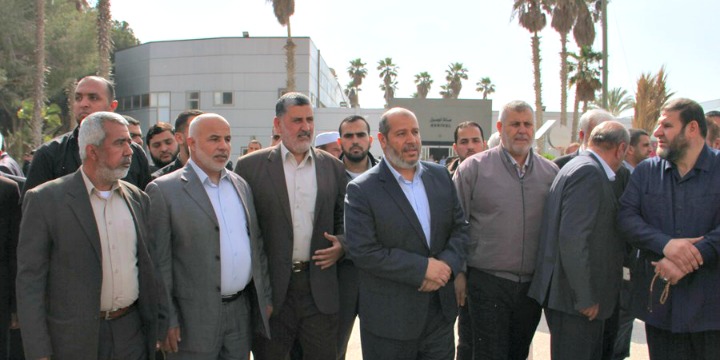‘The Battle With Israel Has Moved Outside The Occupied Lands:’ Hamas Leaders Debate International Terror Escalation
 by Ben Cohen
by Ben Cohen


Hamas leaders in Gaza awaiting the body of Dr. Fadi al-Batsh at the Rafah crossing, Apr. 26, 2018. Photo: moi.gov.ps.
Prominent supporters of Hamas have been engaged in a fraught debate on whether to launch terrorist operations against Israeli targets abroad, following the killing earlier this month of a Palestinian engineer in Malaysia in a drive-by shooting that his family blamed on Israel’s Mossad intelligence service.
Dr. Fadi al-Batsh, said by Palestinian sources to have been a Hamas official, was walking to morning prayers at a mosque in Kuala Lumpur, the Malaysian capital, when he was shot dead by a passing motorcyclist on Apr. 21. Among those who paid tribute to al-Batsh — a Gazan who worked as a lecturer in electrical engineering — was Hamas leader Ismail Haniyeh, who urged the Malaysian government to launch an investigation that would “reveal the involvement of the Mossad organization in the assassination.” Haniyeh also added pointedly, “The battle with Israel has moved outside the occupied lands.”
Haniyeh’s latter statement has resulted in a wide-ranging debate in the pro-Hamas media about the legitimacy and efficacy of attacking Israeli targets around the world. A report released on Tuesday by the Middle East Media Research Institute (MEMRI) documented several instances of open calls for military action against Israel “outside the occupied lands,” all of them published by Hamas-linked outlets in the days following al-Batsh’s death.
Writing in the Filastin daily, columnist Fayez Abu Shamalah asked, “Why shouldn’t the response come outside the borders of Palestine, when the Palestinians and Arabs are being attacked outside the land of Palestine?”
A similar tone was adopted by Yousuf Rizqa — a former adviser to Haniyeh — who said the killing of al-Batsh was consistent with “ancient and modern Jewish thought [that] assassinations are useful.”
“In the past, they tried to murder the Prophet, and they have assassinated al-Batsh and dozens of other scientists, from Palestine, Iraq, Egypt, Iran, and other places,” Rizqa continued. “There is no value in the political statement that we do not operate abroad, because this statement tempts the Mossad to completely take over the overseas arenas and to murder whenever and wherever it pleases.”
Rizqa concluded: “Therefore, there is no escape but for the Palestinians to reexamine the rules of the game and to consult the Quran and Arab heritage in this matter…As long as countries cannot successfully thwart the Mossad attacks against innocent scientists, they will have to agree to the consequences of these vengeance operations.”
Not every pro-Hamas commentator was equally enthused, however. Writing on the Al-Risala website, Wisam Hasan Abu Shamala cited key strategic considerations against Hamas terror operations in foreign countries — not least Israel’s growing diplomatic influence and its consequent “ramifications for the Palestinians in general, and for Hamas in particular.”
“The choice of escalating the hostilities with the occupation and expanding them to more than one arena requires a supportive, or at least a balanced, regional and international environment,” Abu Shamala asserted. “This is something that does not exist at this time, which is characterized by a rapid march toward normalization with the occupation.”
Abu Shamala concluded that “it was unreasonable that at this stage, Hamas, and the Palestinian resistance in general, would choose the option of attacking the enemy abroad. Thus, the more reasonable option that remains is to threaten to harm the enemy when the time is right.”
 Iran Sentences Rapper Toomaj Salehi to Death Over 2022-23 Unrest
Iran Sentences Rapper Toomaj Salehi to Death Over 2022-23 Unrest Netanyahu: ‘Antisemitic Mobs Have Taken Over Leading U.S. Universities’
Netanyahu: ‘Antisemitic Mobs Have Taken Over Leading U.S. Universities’ U.S. Decides Against Sanctions on IDF’s Netzah Yehuda Battalion
U.S. Decides Against Sanctions on IDF’s Netzah Yehuda Battalion Israel Says It Is Poised to Move on Rafah
Israel Says It Is Poised to Move on Rafah Israeli Hostage Hersh Goldberg-Polin Seen Alive in a New Hamas Video
Israeli Hostage Hersh Goldberg-Polin Seen Alive in a New Hamas Video Palestinian Prime Minister Announces New Reform Package
Palestinian Prime Minister Announces New Reform Package France: Man Suspected of Abducting, Raping Jewish Woman ‘to Avenge Palestine’
France: Man Suspected of Abducting, Raping Jewish Woman ‘to Avenge Palestine’ Israel Intensifies Strikes Across Gaza, Orders New Evacuations in North
Israel Intensifies Strikes Across Gaza, Orders New Evacuations in North Iran Threatens to Annihilate Israel Should It Launch a Major Attack
Iran Threatens to Annihilate Israel Should It Launch a Major Attack ‘Completely Baseless’: Reports of Mass Graves at Gaza Hospitals are False, IDF Says
‘Completely Baseless’: Reports of Mass Graves at Gaza Hospitals are False, IDF Says



 Israel Says It Is Poised to Move on Rafah
Israel Says It Is Poised to Move on Rafah U.S. Decides Against Sanctions on IDF’s Netzah Yehuda Battalion
U.S. Decides Against Sanctions on IDF’s Netzah Yehuda Battalion Netanyahu: ‘Antisemitic Mobs Have Taken Over Leading U.S. Universities’
Netanyahu: ‘Antisemitic Mobs Have Taken Over Leading U.S. Universities’ Iran Sentences Rapper Toomaj Salehi to Death Over 2022-23 Unrest
Iran Sentences Rapper Toomaj Salehi to Death Over 2022-23 Unrest Israeli Hostage Hersh Goldberg-Polin Seen Alive in a New Hamas Video
Israeli Hostage Hersh Goldberg-Polin Seen Alive in a New Hamas Video